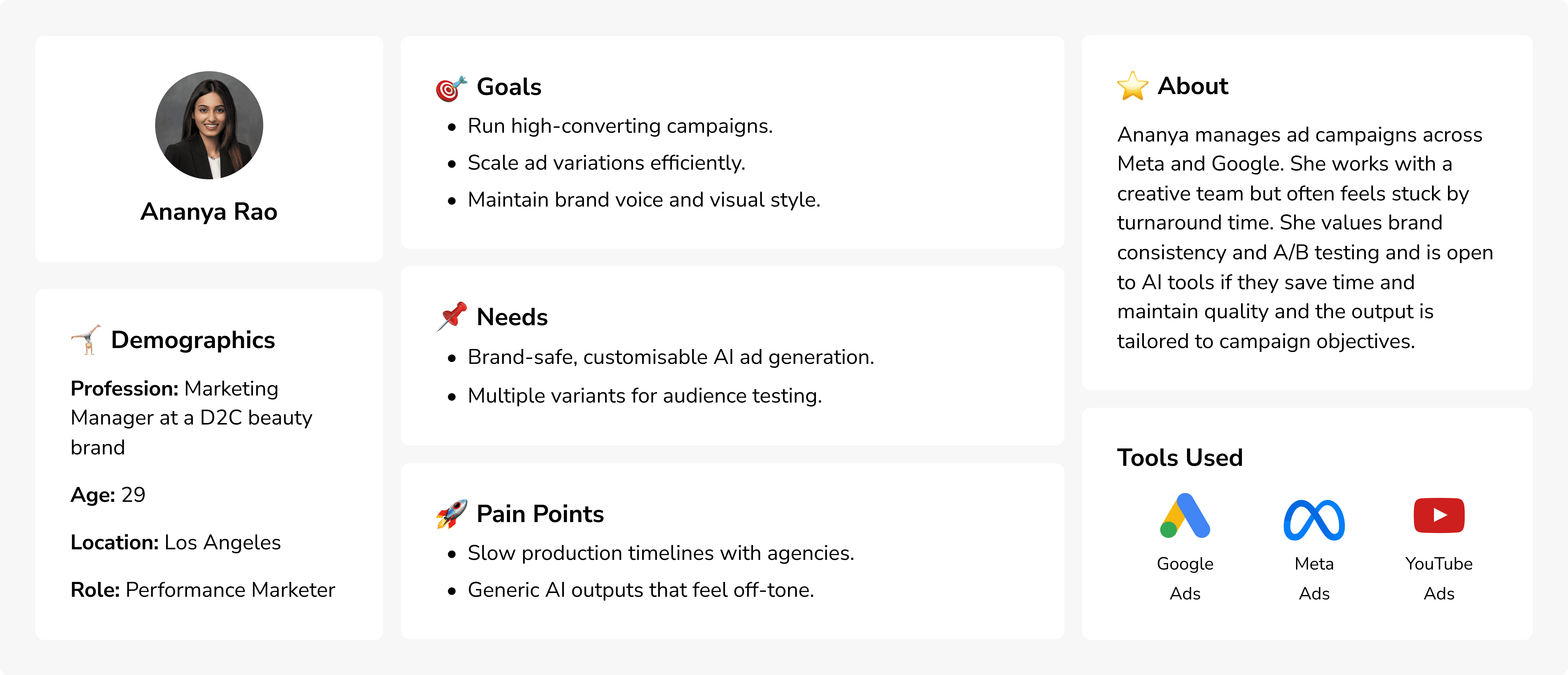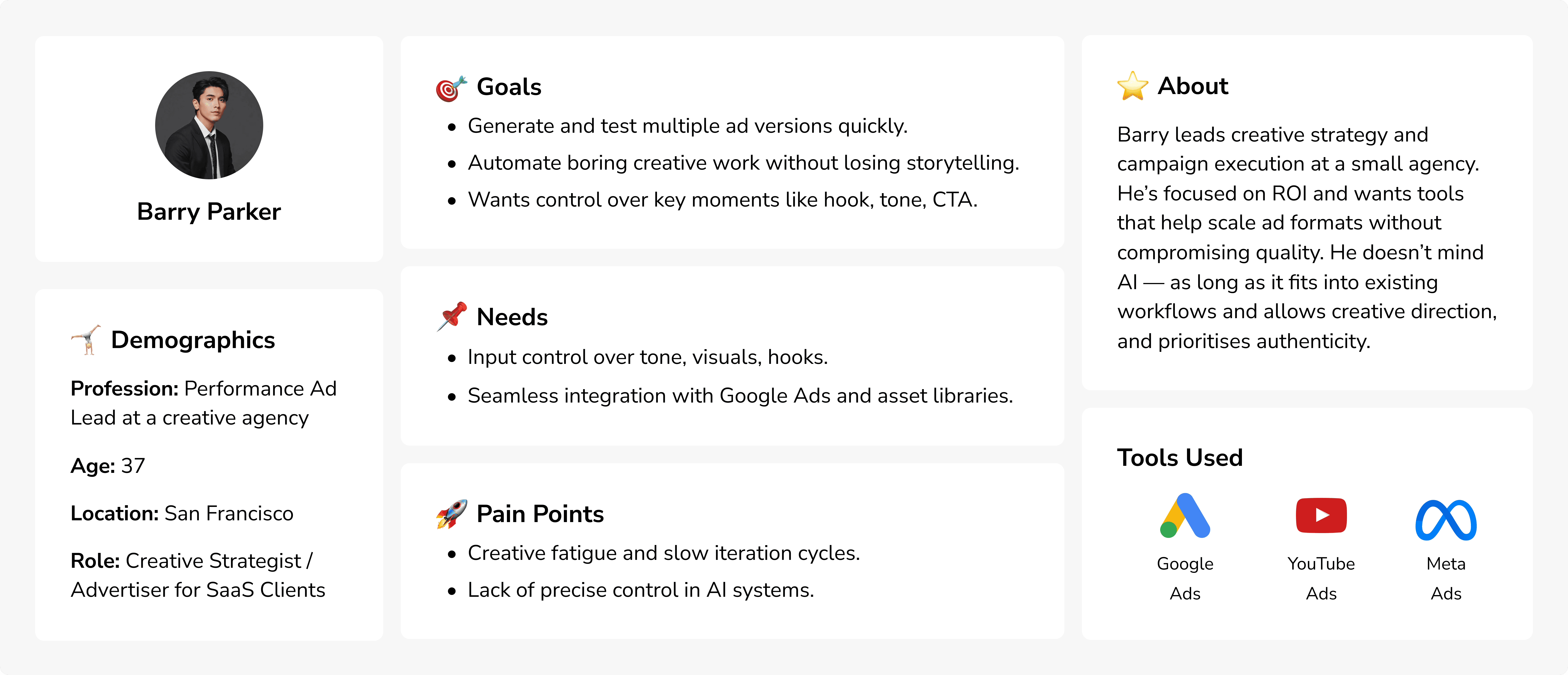

Google Ads + Veo3
An AI-powered workflow inside Google Ads that enables advertisers to generate, test, and optimise video ads using Google Veo3, directly from campaign inputs.
MY ROLE
Product Designer
MY TEAM
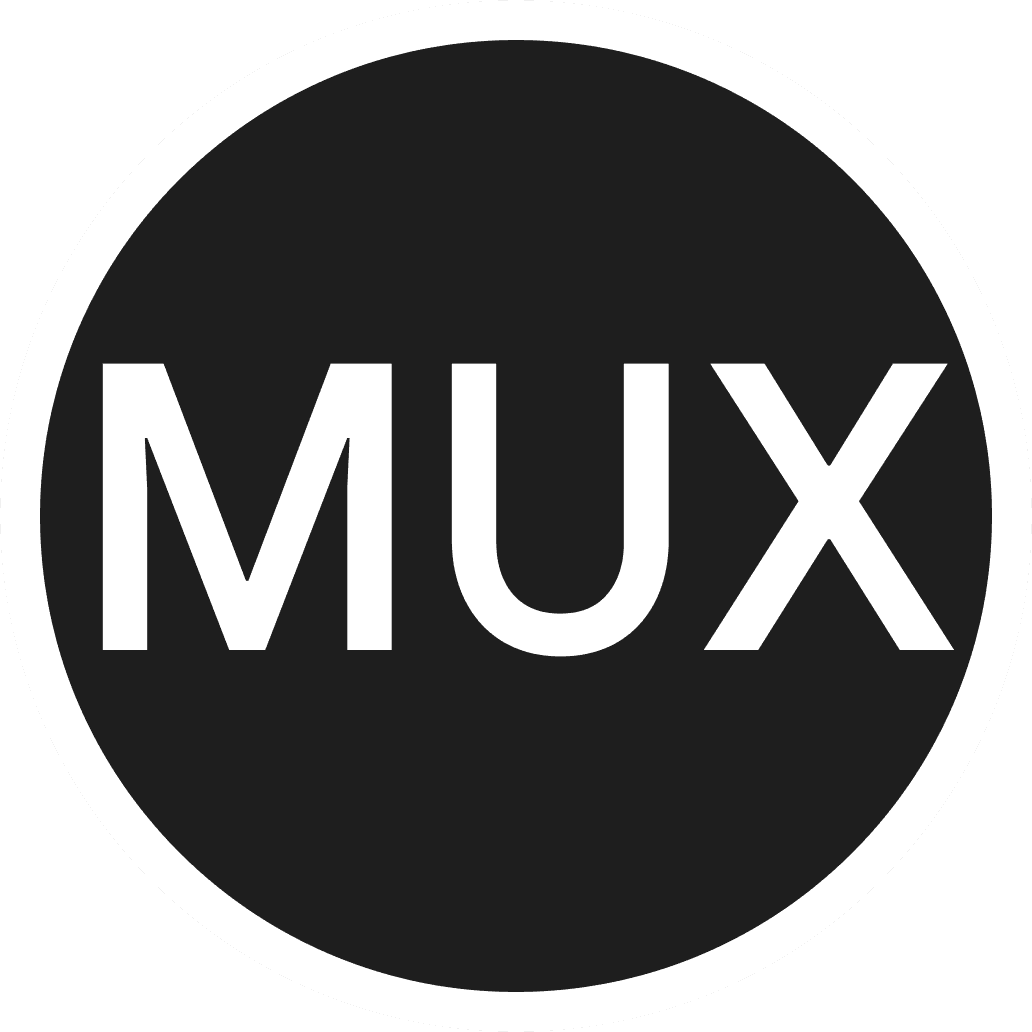





TIMELINE
6 Months
70-80%
Estimated reduction in time to create video ads
5-10x
Estimated increase in creative variants tested per campaign
3 Key Metrics
CTR | CVR | CPA, unified into single decision dashboard
PROBLEM
Video ads perform better than static creatives, but creating and testing them is expensive, slow, and fragmented. Advertisers struggle to generate video at scale and clearly understand which creatives drive performance.
OUTCOME
I designed an in-product AI video ad workflow that enables advertisers to generate multiple video variants, launch A/B tests, and evaluate performance using clear, decision-oriented metrics.
The system connects creative generation directly to campaign outcomes.


Google Ads + Veo3
An AI-powered workflow inside Google Ads that enables advertisers to generate, test, and optimise video ads using Google Veo3, directly from campaign inputs.
MY ROLE
Product Designer
MY TEAM






TIMELINE
6 Months
PROBLEM
Video ads perform better than static creatives, but creating and testing them is expensive, slow, and fragmented. Advertisers struggle to generate video at scale and clearly understand which creatives drive performance.
OUTCOME
I designed an in-product AI video ad workflow that enables advertisers to generate multiple video variants, launch A/B tests, and evaluate performance using clear, decision-oriented metrics.
The system connects creative generation directly to campaign outcomes.
70-80%
Estimated reduction in time to create video ads
5-10x
Estimated increase in creative variants tested per campaign
3 Key Metrics
CTR | CVR | CPA, unified into single decision dashboard

Google Ads + Veo3
An AI-powered workflow inside Google Ads that enables advertisers to generate, test, and optimise video ads using Google Veo3, directly from campaign inputs.
MY ROLE
Product Designer
MY TEAM



TIMELINE
6 Months
PROBLEM
Video ads perform better than static creatives, but creating and testing them is expensive, slow, and fragmented. Advertisers struggle to generate video at scale and clearly understand which creatives drive performance.
OUTCOME
I designed an in-product AI video ad workflow that enables advertisers to generate multiple video variants, launch A/B tests, and evaluate performance using clear, decision-oriented metrics.
The system connects creative generation directly to campaign outcomes.
70-80%
Estimated reduction in time to create video ads
5-10x
Estimated increase in creative variants tested per campaign
3 Key Metrics
CTR | CVR | CPA, unified into single decision dashboard

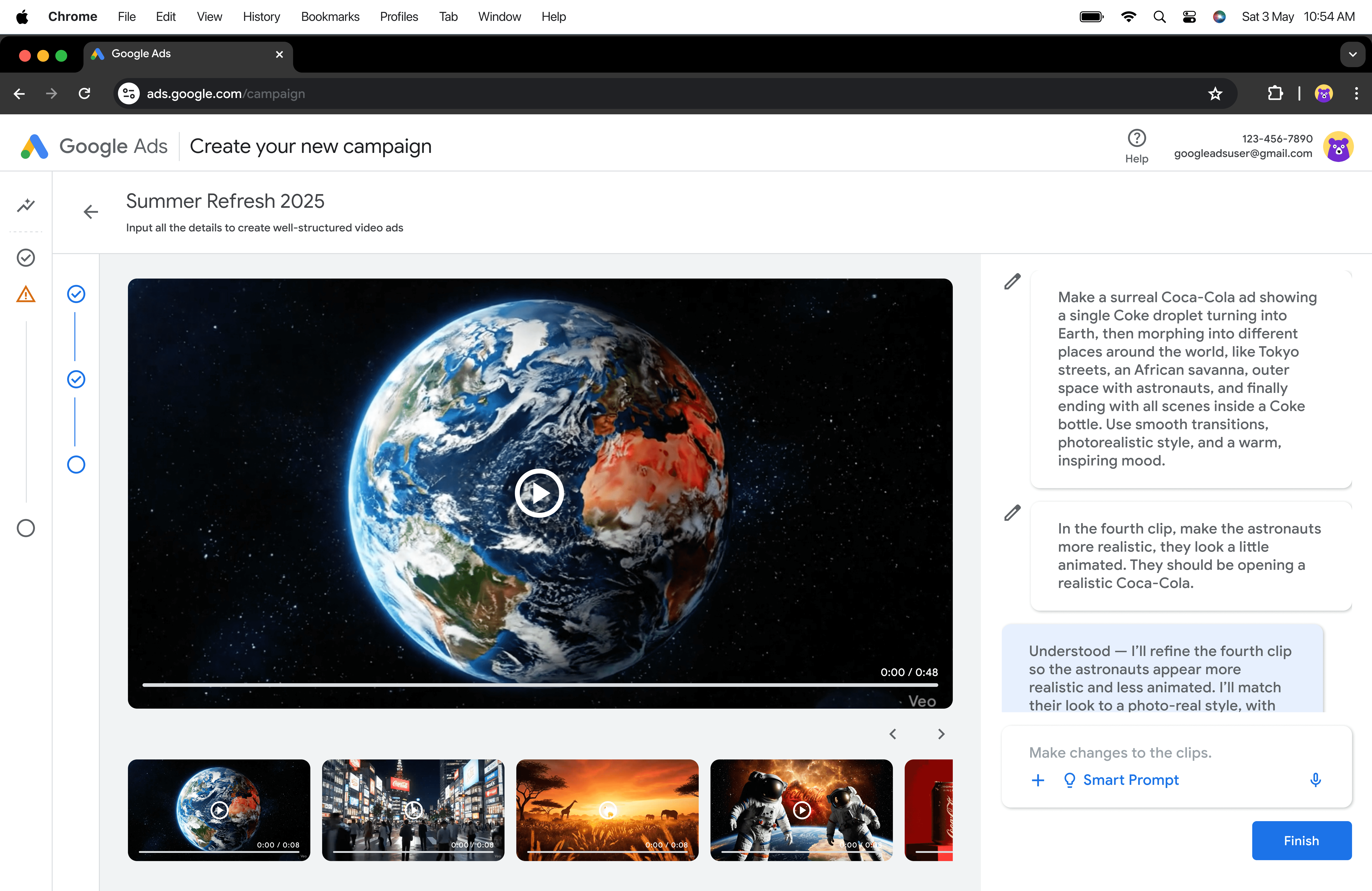

Context
Context
This project was designed to live inside
This project was designed to live inside


extending the campaign creation flow and to make AI video generation feel like a
extending the campaign creation flow and to make AI video generation feel like a
natural evolution of ad creation, rather than introducing a standalone tool.
natural evolution of ad creation, rather than introducing a standalone tool.
Why Now?
Why Now?
Video Ads consistently outperformed static formats, but production remains expensive and slow, especially for SMBs.
Video Ads consistently outperformed static formats, but production remains expensive and slow, especially for SMBs.


Gen AI Ad generation was adopted by various companies.
Gen AI Ad generation was adopted by various companies.


Gen AI market has been rising because of better models.
Gen AI market has been rising because of better models.


SMB Advertisers needed faster creation and testing for ad campaigns.
SMB Advertisers needed faster creation and testing for ad campaigns.
Stake
Help SMBs produce video ads without agency-level time or budgets.
Constraint
Limited access to production resources and end users.
Success
~90% reduction in time to first
video ad.
Stake
Help SMBs produce video ads without agency-level time or budgets.
Constraint
Limited access to production resources and end users.
Success
~90% reduction in time to first
video ad.
User Research
User Research
I validated what it would take for SMBs to trust and adopt AI-generated video ads in Google Ads, grounded in interviews, competitive benchmarks, and Ads UX research input.
I validated what it would take for SMBs to trust and adopt AI-generated video ads in Google Ads, grounded in interviews, competitive benchmarks, and Ads UX research input.
Research at a glance
Research at a glance
Goal: validate what it takes for SMBs to trust AI video, keep creative control, and still move fast.
Goal: validate what it takes for SMBs to trust AI video, keep creative control, and still move fast.


User Research Patters
User Research Patters
I documented interviews, pulled quotes, and synthesized patterns.
I documented interviews, pulled quotes, and synthesized patterns.

Emotioanls Trust / Authenticity

Emotioanls Trust / Authenticity
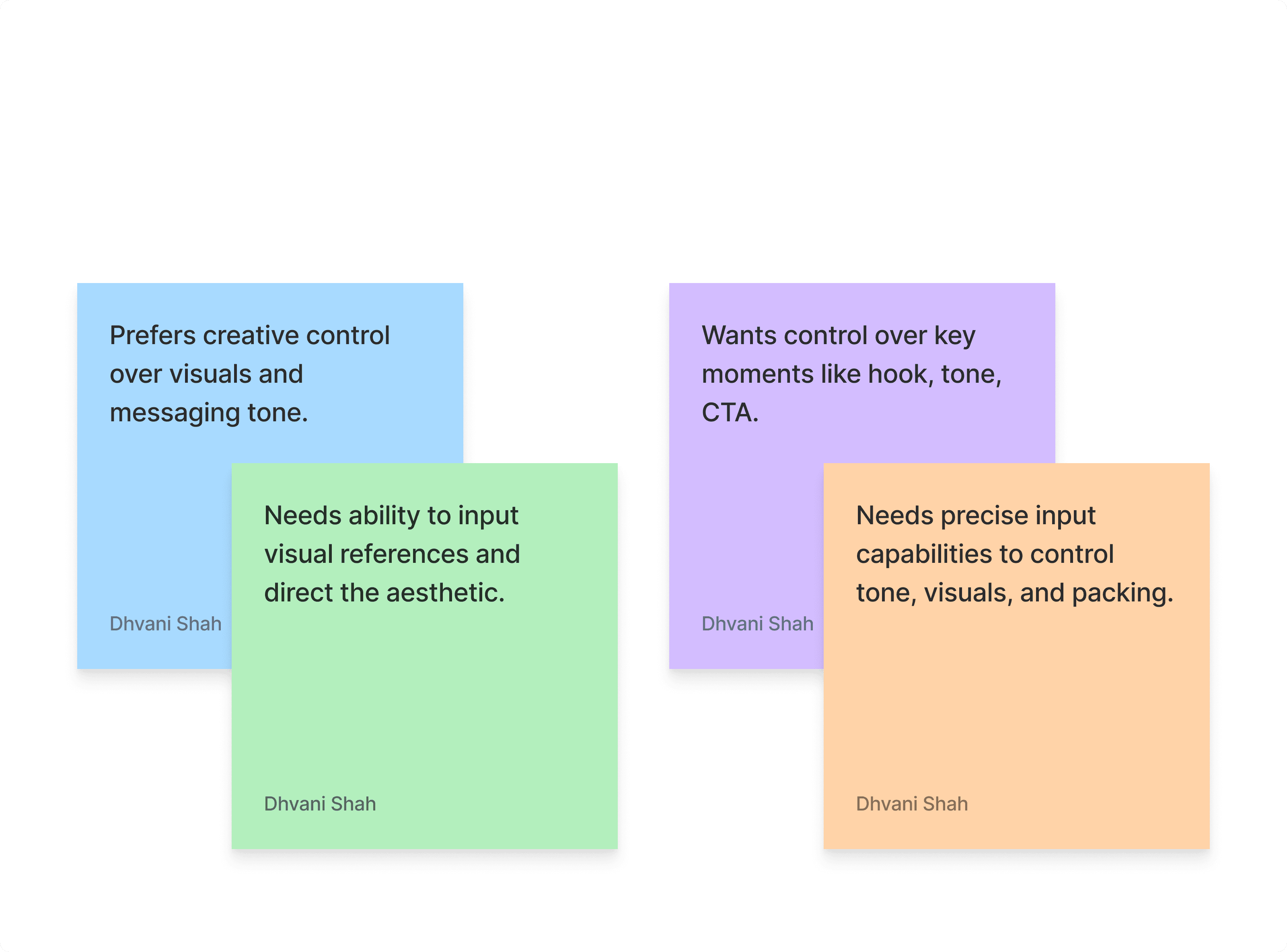
Creative Control

Creative Control

Time & Resource Saving

Time & Resource Saving
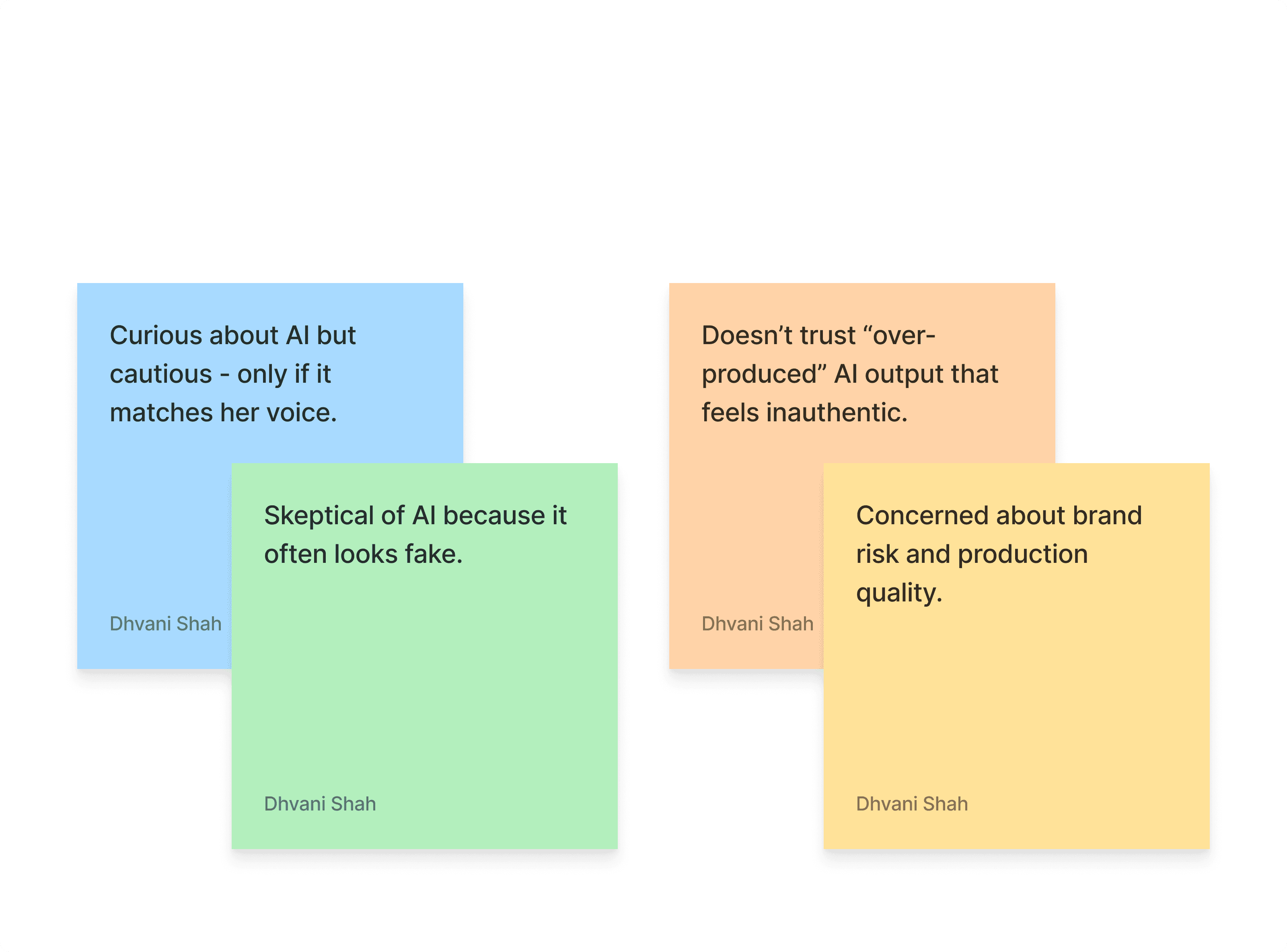
AI Skepticism

AI Skepticism
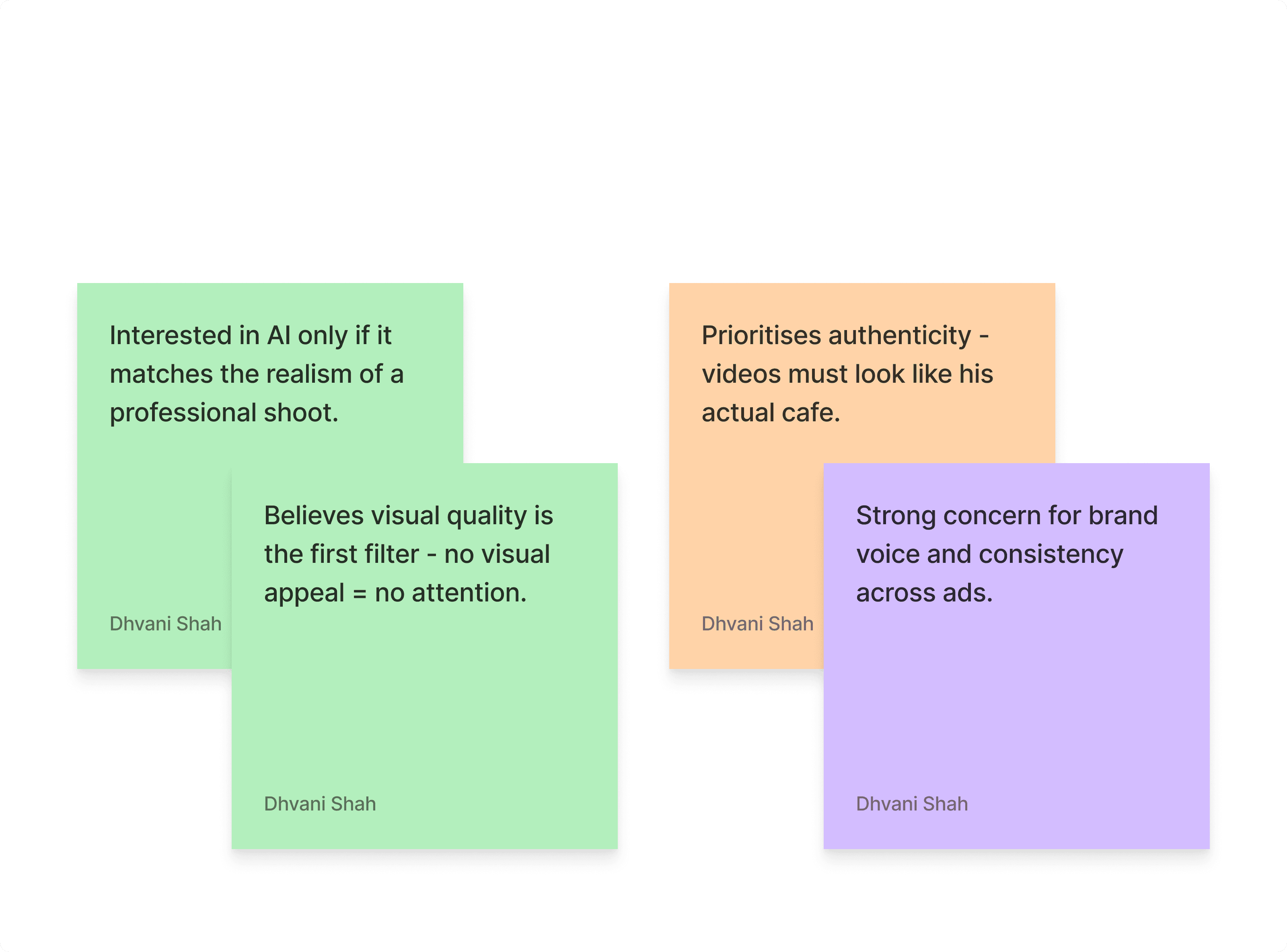
Visual Quality / Realism

Visual Quality / Realism
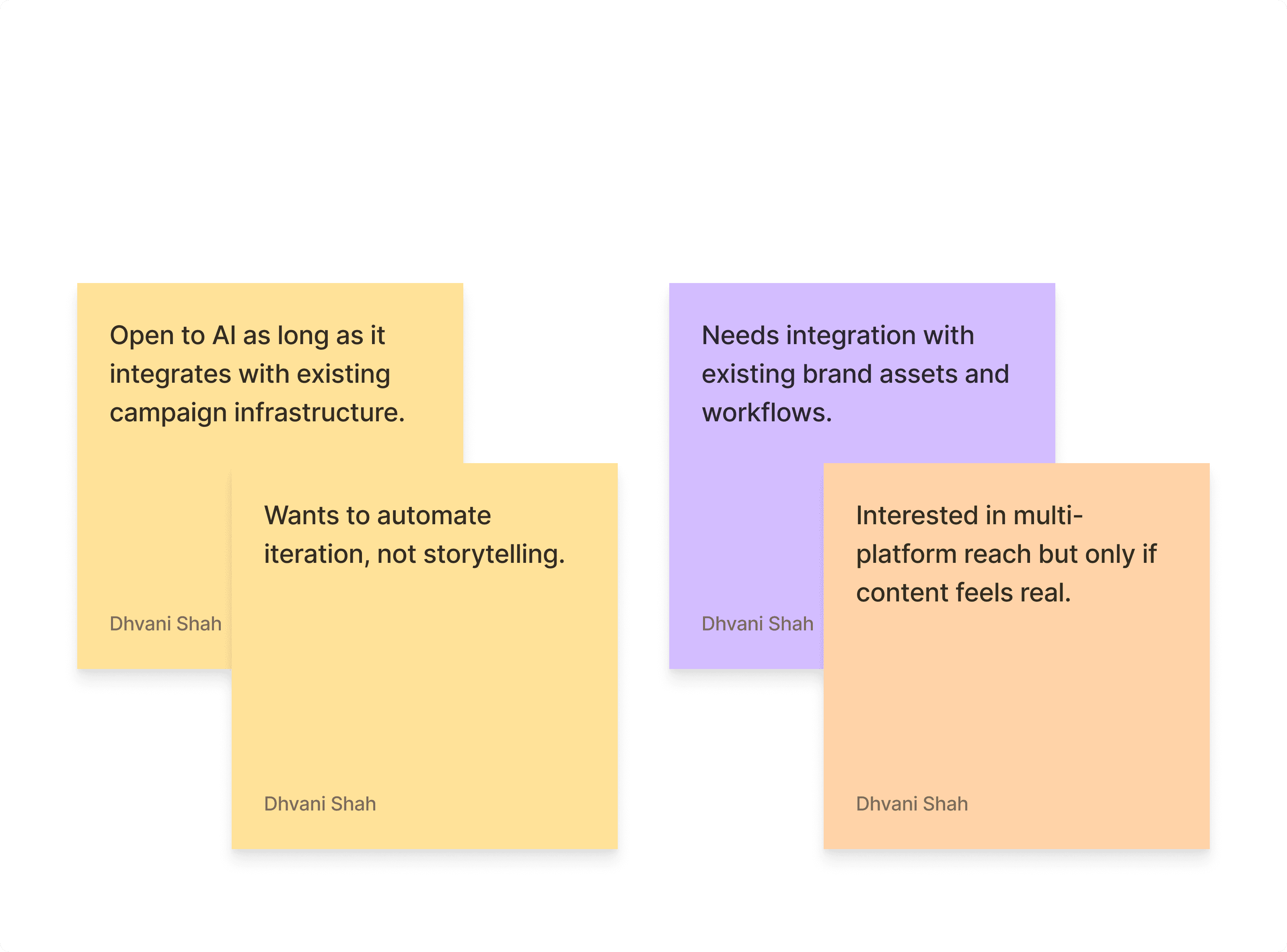
Platform Integration & Workflow

Platform Integration & Workflow
Competitive Landscape
Competitive Landscape
I then pressure-tested assumptions against real GenAI video tools.
I then pressure-tested assumptions against real GenAI video tools.
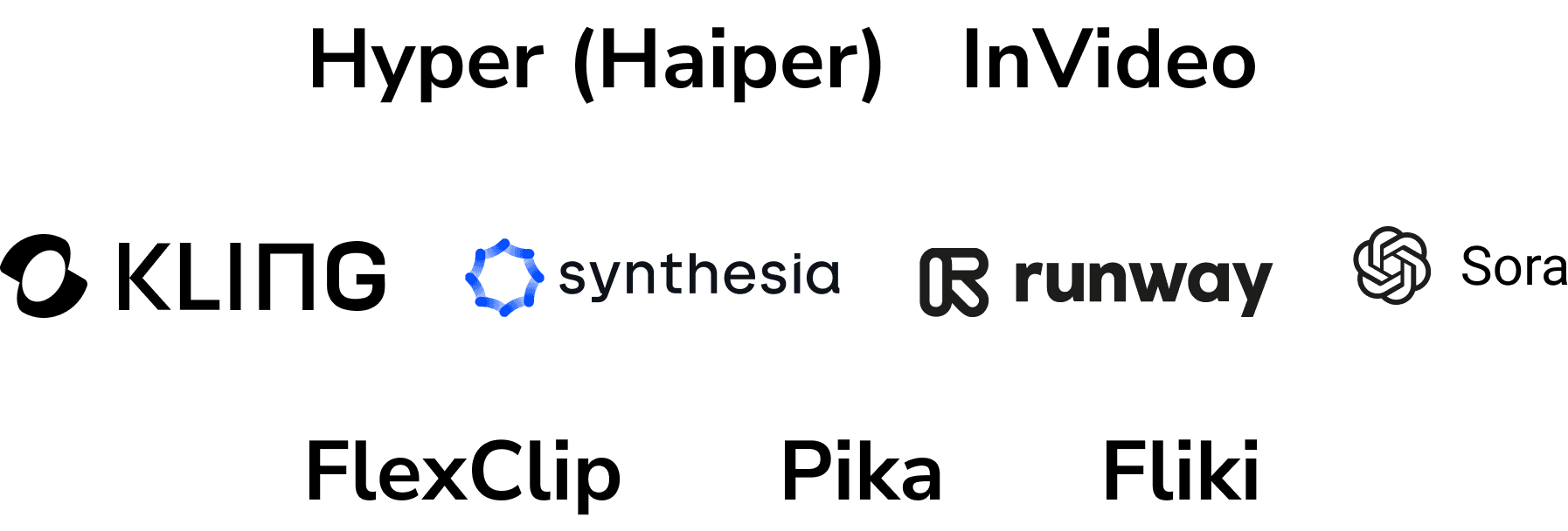

What I learned
What I learned


Problem & Opportunity
Problem & Opportunity
Video ads work, but whole productions are expensive and time consuming, which act as a blocker for SMBs, so the opportunity is AI video creation directly inside Google Ads.
Video ads work, but whole productions are expensive and time consuming, which act as a blocker for SMBs, so the opportunity is AI video creation directly inside Google Ads.
Before
Before
Video = Slow + External Tools
Video = Slow + External Tools
Missing
Missing
Trust + Control + Fast Learning
Trust + Control + Fast Learning
Opportunity
Opportunity
AI Video inside Google Ads
AI Video inside Google Ads
Target User
Target User
This is for SMBs running their own ads who need speed and results without an agency.
This is for SMBs running their own ads who need speed and results without an agency.
User Core Needs
User Core Needs

Generate Fast

Generate Fast

Edit Control

Edit Control

CTR, CVR, CPA Clarity

CTR, CVR, CPA Clarity

Trust Cues

Trust Cues

A/B Variants

A/B Variants
Product Goals & Strategy
Product Goals & Strategy
What “winning” meant for users and the business.
What “winning” meant for users and the business.

USER
Wants a faster video generation method
Increase video adoption and faster ideation
01
BUSINESS
Increase video adoption and faster ideation

USER
Wants a faster video generation method
Increase video adoption and faster ideation
01
BUSINESS
Increase video adoption and faster ideation

USER
Choose from multiple ads to see which is doing best
Improve efficiency via CTR | CVR | CPA decisions
02
BUSINESS

USER
Choose from multiple ads to see which is doing best
Improve efficiency via CTR | CVR | CPA decisions
02
BUSINESS
The tradeoff we optimised for:
The tradeoff we optimised for:
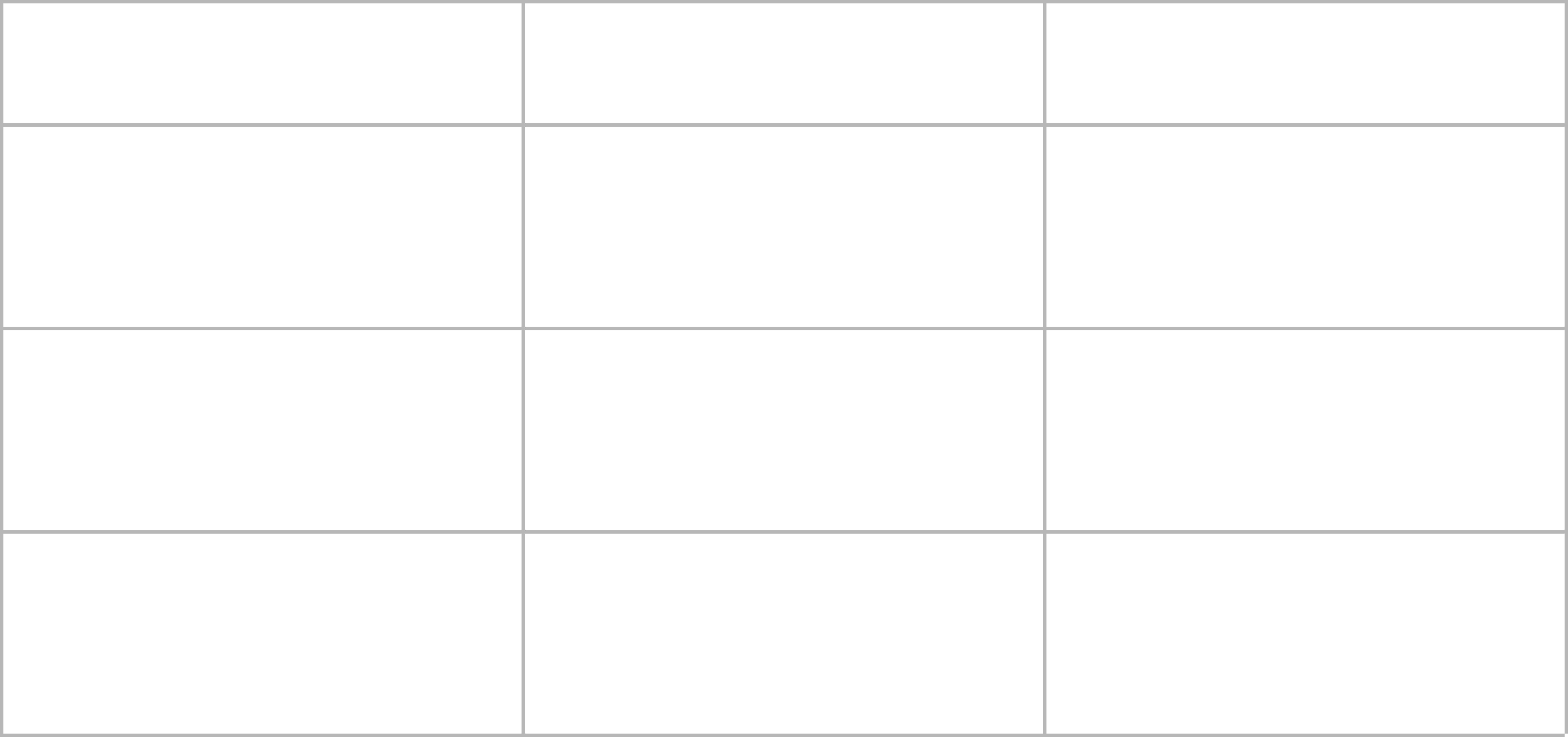
Trade Off
Basic edits vs pro editor
Kept lightweight trimming + swaps; avoided timeline/VFX complexity.
“Edit required” task completion rate (can users make the needed change?).
Used structured levers (tone, pacing, scenes) instead of endless prompting.
Control satisfaction (1–5) + number of regeneration loops.
Designed for campaign context, export formats, and measurement from day one.
Drop-off points across the flow + time from draft → publish.
Guided controls vs full freedom
In-Ads flow vs standalone tool
Explanation
Test

Trade Off
Basic edits vs pro editor
Kept lightweight trimming + swaps; avoided timeline/VFX complexity.
“Edit required” task completion rate (can users make the needed change?).
Used structured levers (tone, pacing, scenes) instead of endless prompting.
Control satisfaction (1–5) + number of regeneration loops.
Designed for campaign context, export formats, and measurement from day one.
Drop-off points across the flow + time from draft → publish.
Guided controls vs full freedom
In-Ads flow vs standalone tool
Explanation
Test
Ideation
Ideation
Directions Explored
Directions Explored
DIRECTION 1
DIRECTION 1

Generate video from campaign inputs
Generate video from campaign inputs
Value: Fast Start
Value: Fast Start
Risk: Low trust if output feels like black box
Risk: Low trust if output feels like black box
DIRECTION 2
DIRECTION 2

Create variants for A/B testing
Create variants for A/B testing
Value: Faster experimentation
Value: Faster experimentation
Risk: Too many options without evaluation
Risk: Too many options without evaluation
DIRECTION 3
DIRECTION 3

End-to-end flow:
generate → edit → variants → export
End-to-end flow:
generate → edit → variants → export
Value: Most compete + Ads Native
Value: Most compete + Ads Native
Risk: Could feel complex if not structured
Risk: Could feel complex if not structured
Convergence
Convergence

Convergence Criteria
DIRECTION 1
Generate from Inputs
Speed to first draft
User Control
Trust/Quality
A/B Readiness
CTR | CVR | CPA Clarity
Ads workflow integration
DIRECTION 2
Variants for testing
DIRECTION 3
End-to-end flow



















Convergence Criteria
DIRECTION 1
Generate from Inputs
Speed to first draft
User Control
Trust/Quality
A/B Readiness
CTR | CVR | CPA Clarity
Ads workflow integration
DIRECTION 2
Variants for testing
DIRECTION 3
End-to-end flow


















Final Plan
Final Plan
The final plan is a structured 5-step Ads flow that gets to a usable video fast, supports edits, and makes testing measurable.
The final plan is a structured 5-step Ads flow that gets to a usable video fast, supports edits, and makes testing measurable.
Upload
Hub
Upload
Hub


Smart
Scene Plan
Smart
Scene Plan


Preview +
AI enabled Hub
Preview +
AI enabled Hub


A/B Variant
Generator
A/B Variant
Generator


Export &
Integrate
Export &
Integrate
Design System & Visual Language
Design System & Visual Language
I extended Google’s Material 3 system with a small set of AI-specific components so Veo video creation, editing, and variant testing feels native inside Google Ads, clear about what’s AI-generated vs user-controlled, and easy to learn.
I extended Google’s Material 3 system with a small set of AI-specific components so Veo video creation, editing, and variant testing feels native inside Google Ads, clear about what’s AI-generated vs user-controlled, and easy to learn.
Typography
Typography
Aa
Aa
Google Sans
Google Sans
Regular and Medium
Regular and Medium
Title Text
Title Text
Title 01
Title 01
Title 02
Title 02
Profile
Profile
Tab Headings
Tab Headings
Large Tabs
Large Tabs
Large Text
Large Text
GS - Medium
GS - Medium
GS - Regular
GS - Regular
GS - Medium
GS - Medium
GS - Medium
GS - Medium
GS - Medium
GS - Medium
GS - Regular
GS - Regular
22 pt
22 pt
22 pt
22 pt
12 pt
12 pt
14 pt
14 pt
16 pt
16 pt
30 pt
30 pt
Body Text
Body Text
Main Body
Main Body
Regular
Regular
Small
Small
Forms
Forms
GS - Medium
GS - Medium
GS - Regular
GS - Regular
GS - Medium
GS - Medium
GS - Regular
GS - Regular
14 pt
14 pt
12 pt
12 pt
12 pt
12 pt
16 pt
16 pt
Buttons
Buttons
Button 1
Button 1
Button 2
Button 2
Indicator
Indicator
GS - Medium
GS - Medium
GS - Regular
GS - Regular
GS - Medium
GS - Medium
14 pt
14 pt
14 pt
14 pt
8 pt
8 pt
Color Palette
Color Palette
Brand Colors
Brand Colors
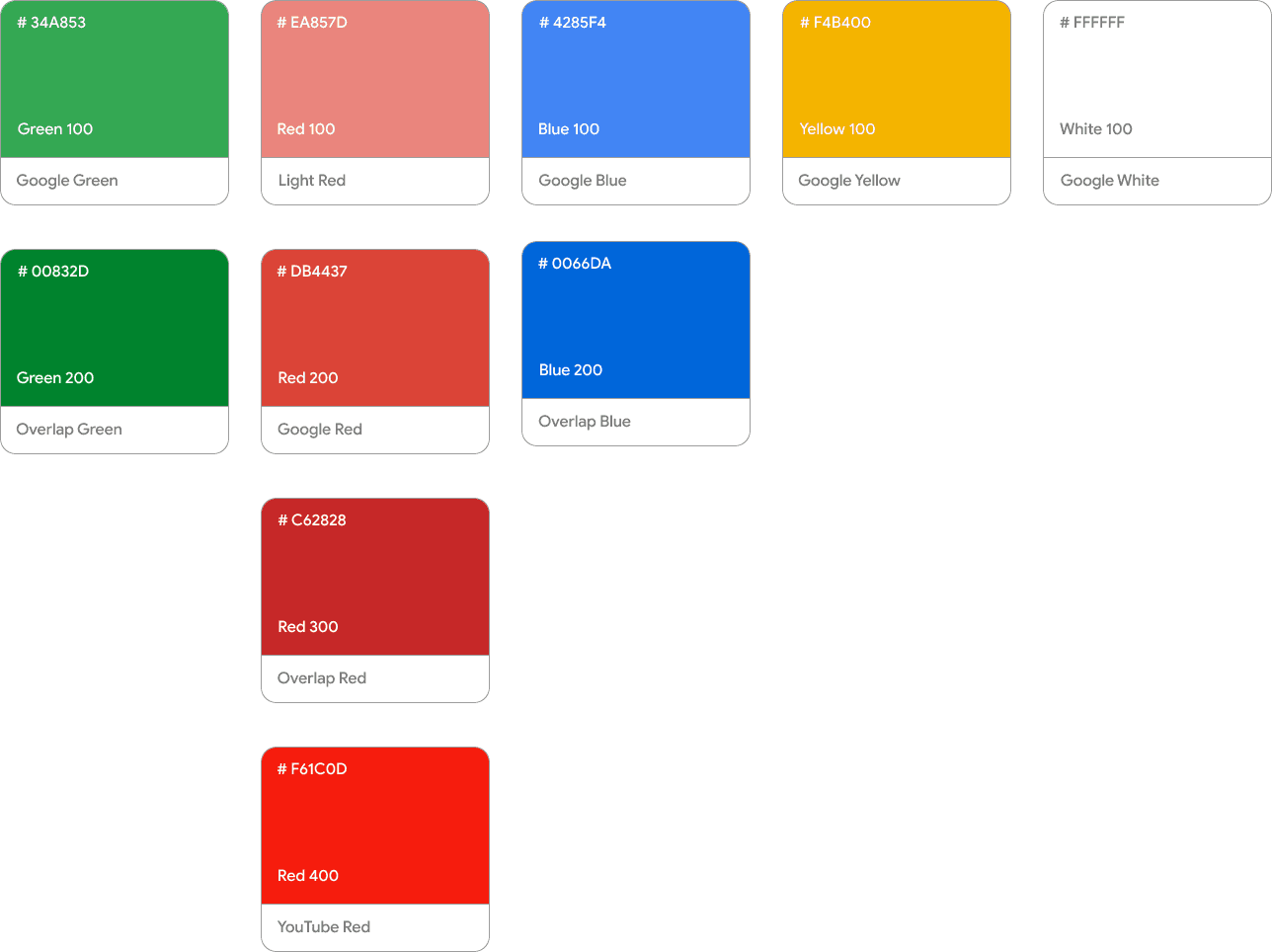

Text Styles
Text Styles


Icons
Icons


Background
Background


Addition to Design System
Addition to Design System

Final Generated Video Player
Generated Clips Player
Added Media
Status Cards
Campaign Cards
AI Chatbox
Media Addition Icons and States
Icons Set and States
Social Media Icons
Progress Bar

Final Generated Video Player
Generated Clips Player
Added Media
Status Cards
Campaign Cards
AI Chatbox
Media Addition Icons and States
Icons Set and States
Social Media Icons
Progress Bar
Key Screens
Key Screens
AI-Video Generation Option

Create AI Generated Videos
One-click entry point inside campaign setup, no menu hunting.
Stays in the Assets Step
Keeps video creation where advertisers already add images/headlines.

Create AI Generated Videos
One-click entry point inside campaign setup, no menu hunting.
Stays in the Assets Step
Keeps video creation where advertisers already add images/headlines.
Campaign Dashboard
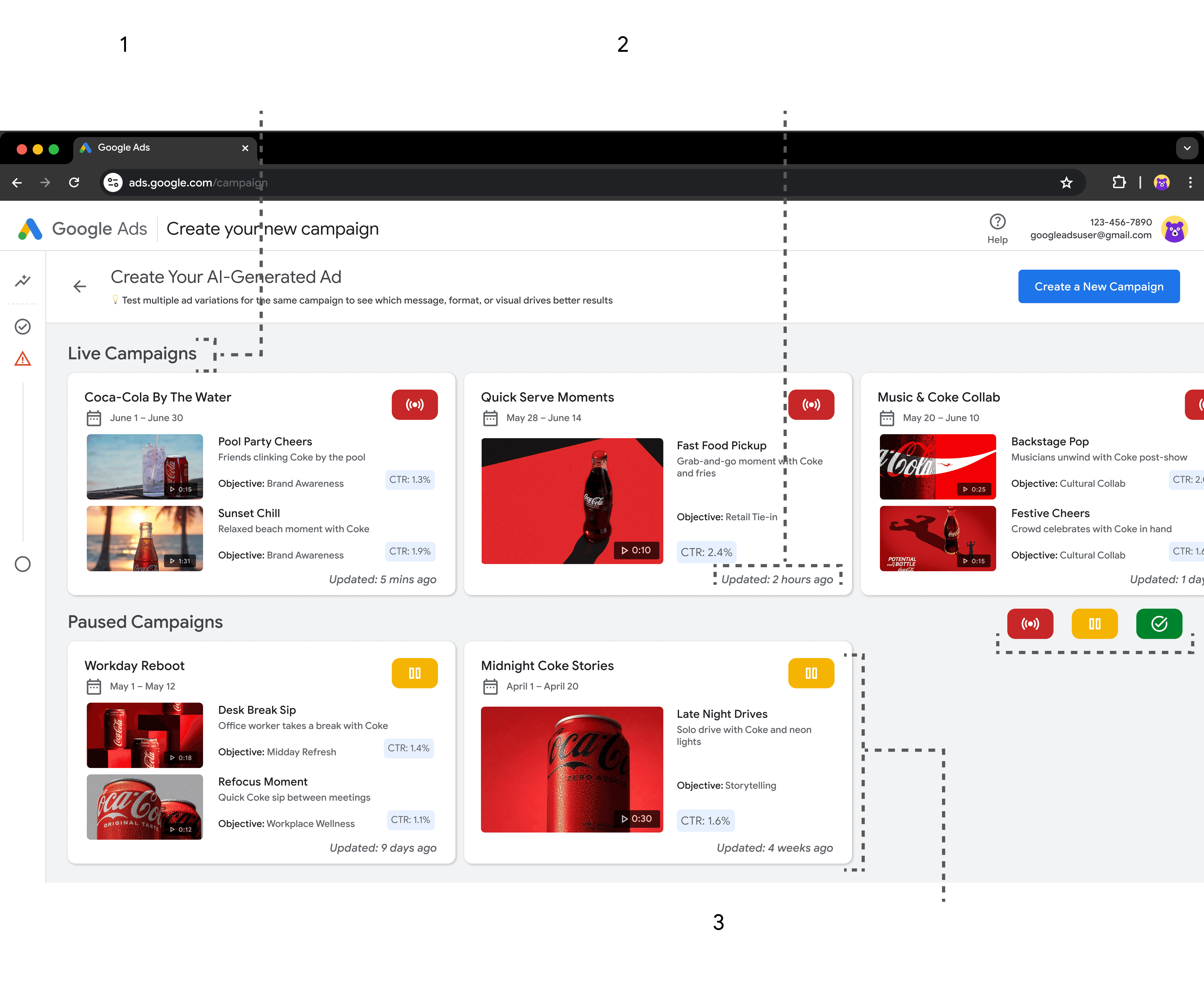
Card Level Performance
Each campaign shows key details + CTR so you know what needs attention.
Last Updated
Quick recency signal to spot stale vs active work.
Campaign status at a glance
Live, paused, and completed campaigns in one view.

Card Level Performance
Each campaign shows key details + CTR so you know what needs attention.
Last Updated
Quick recency signal to spot stale vs active work.
Campaign status at a glance
Live, paused, and completed campaigns in one view.
Multi-media Upload
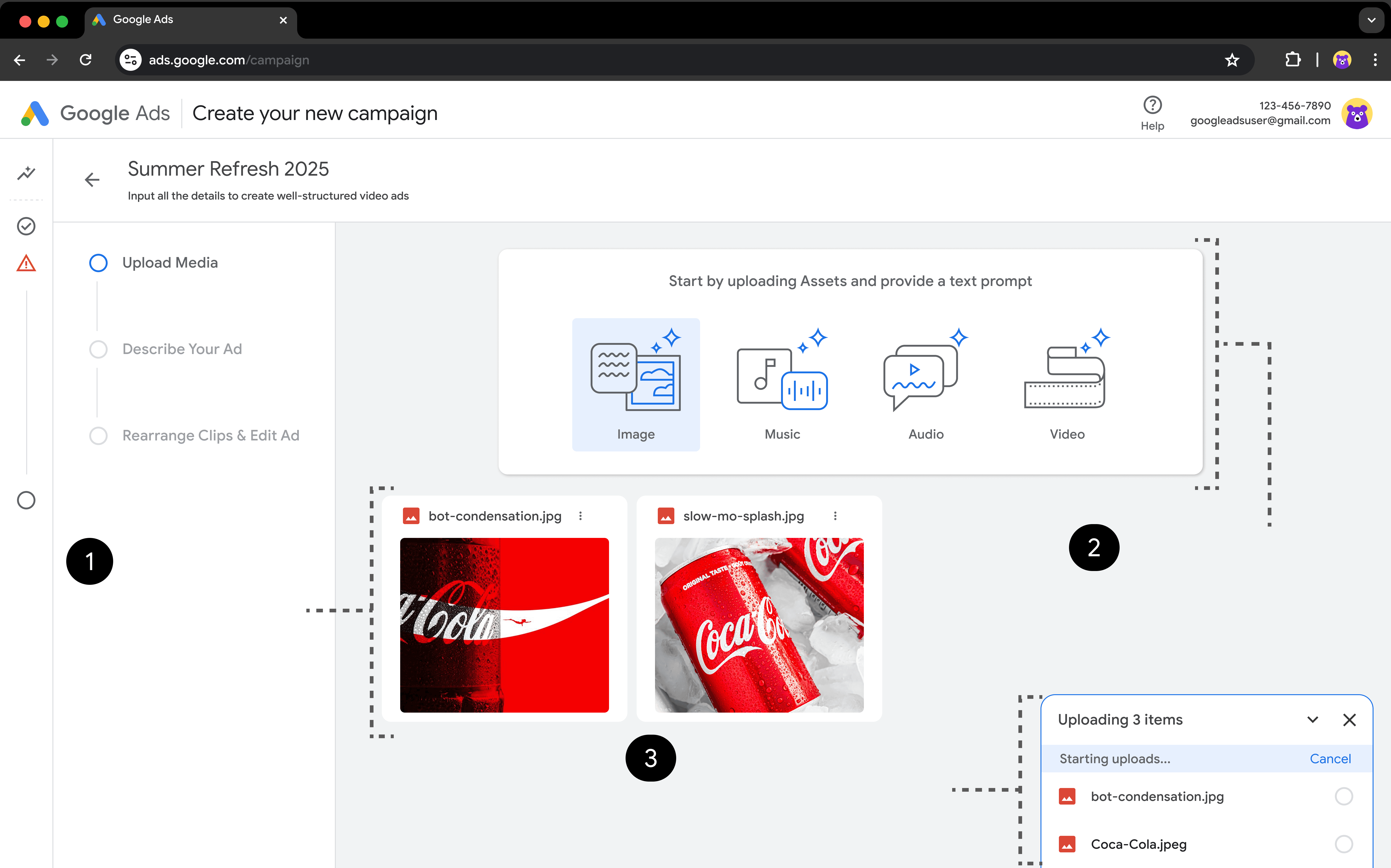
Drive-like asset hub
Upload and manage assets in a familiar Google pattern.
Upload Feedback
Clear progress + success states to build trust.
Supports mixed media
Images, video, audio, and music in one structured place.

Drive-like asset hub
Upload and manage assets in a familiar Google pattern.
Upload Feedback
Clear progress + success states to build trust.
Supports mixed media
Images, video, audio, and music in one structured place.
Prompt-based Creation (Gemini)
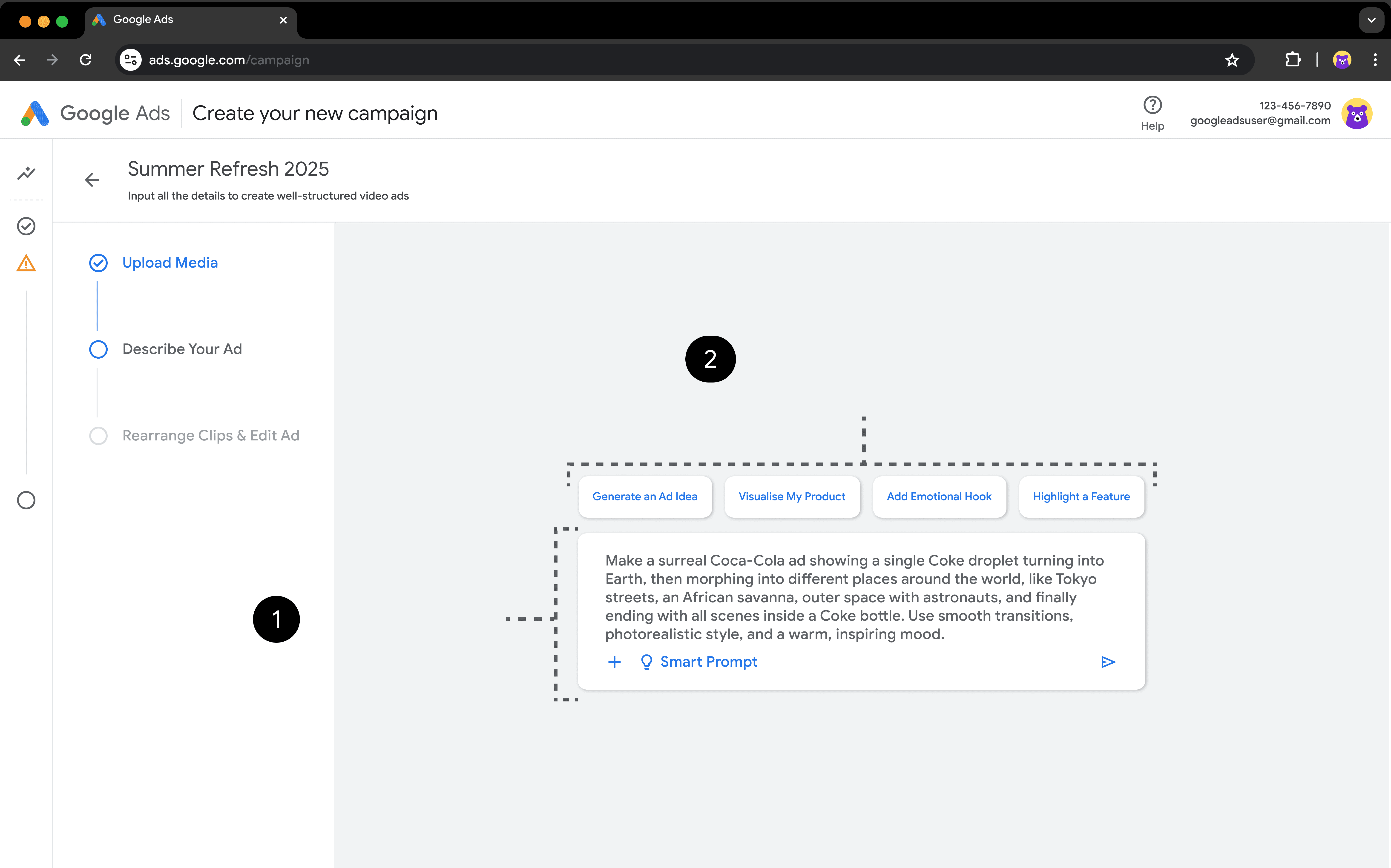
Describe the Ad
Type or speak what you want the ad to be.
Guided Prompt Chips
Jumpstart ideas when you don’t know what to write.

Describe the Ad
Type or speak what you want the ad to be.
Guided Prompt Chips
Jumpstart ideas when you don’t know what to write.
Prompt-based Creation (Gemini)
Smart Clip Editing

Chat to update the clip
Describe the change, Gemini applies it to that clip.
Select a clip to edit
Pick one clip without redoing the whole video.
Clip-by-clip timeline
The ad is broken into short clips you can review.

Chat to update the clip
Describe the change, Gemini applies it to that clip.
Select a clip to edit
Pick one clip without redoing the whole video.
Clip-by-clip timeline
The ad is broken into short clips you can review.
Built-in A/B Testing
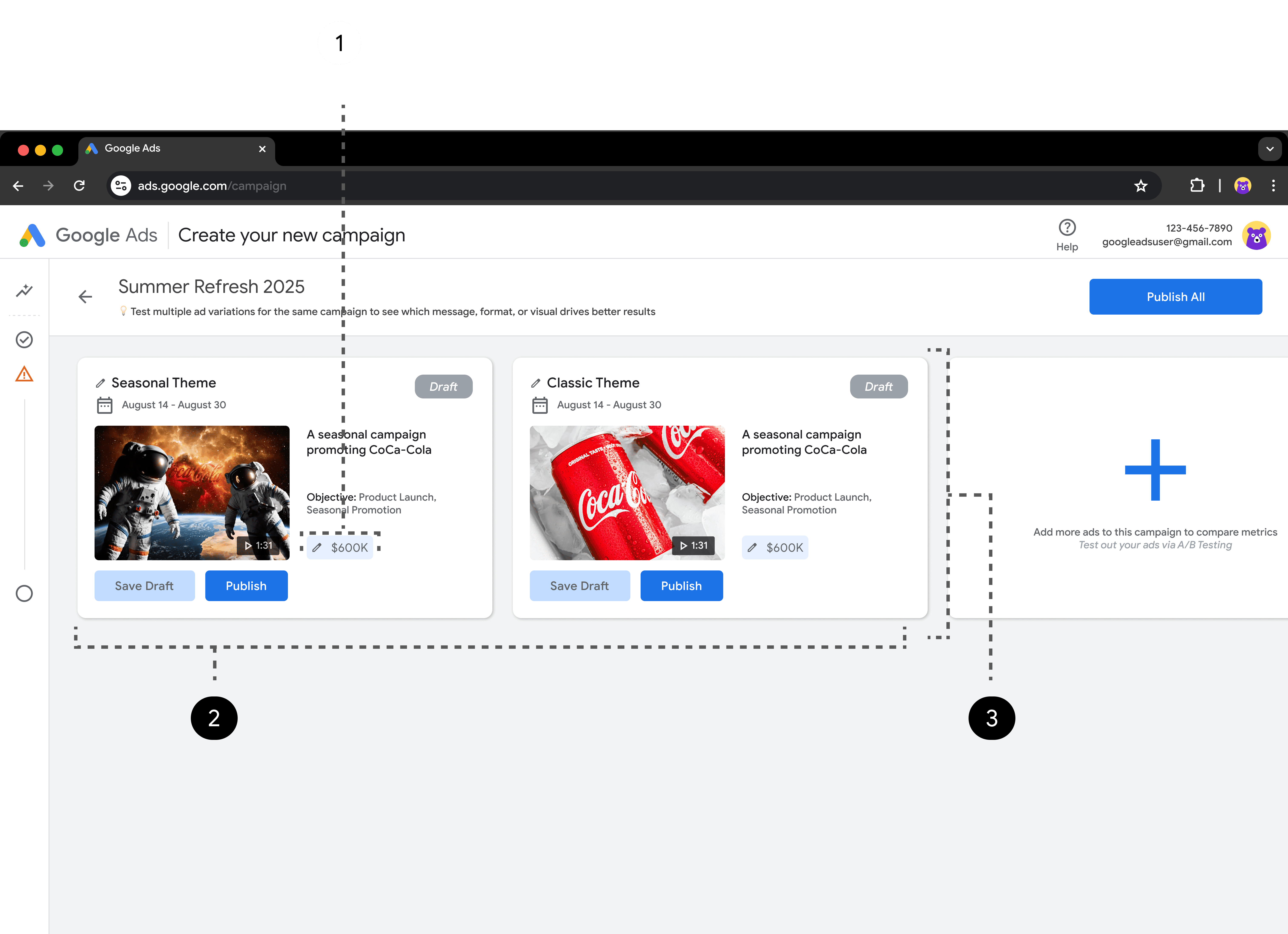
Budget Allocation
Control how spend is split across variants.
Side-by-side testing
Run both and see which one performs better.
Add a second variant
Create another ad in the same campaign for comparison.

Budget Allocation
Control how spend is split across variants.
Side-by-side testing
Run both and see which one performs better.
Add a second variant
Create another ad in the same campaign for comparison.
Performance Insights
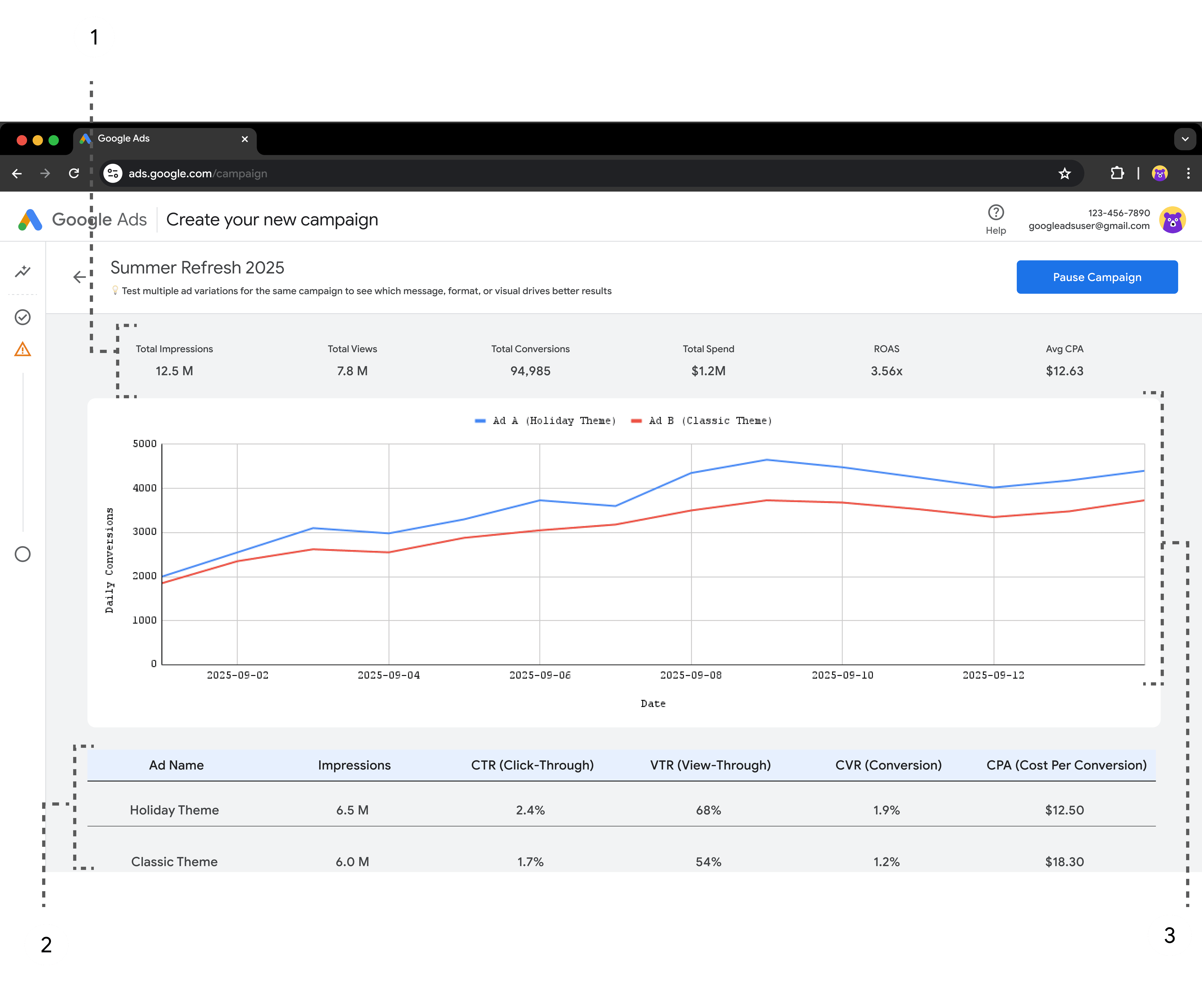
Campaign Summary
Top-line totals: impressions, views, conversions, spend, ROAS, avg CPA.
Variant Comparison
A vs B on CTR/CVR/CPA to pick a winner.
Decision-ready view
Makes it obvious what to scale, pause, or iterate.

Campaign Summary
Top-line totals: impressions, views, conversions, spend, ROAS, avg CPA.
Variant Comparison
A vs B on CTR/CVR/CPA to pick a winner.
Decision-ready view
Makes it obvious what to scale, pause, or iterate.
Testing, Iteration, & Validation
Testing, Iteration, & Validation
To validate feasibility, I reached out to Google Ads engineers for technical input. Together, we evaluated each feature based on engineering effort, design fit, and business value.
To validate feasibility, I reached out to Google Ads engineers for technical input. Together, we evaluated each feature based on engineering effort, design fit, and business value.


Outcome & Ownership
Outcome & Ownership
Impact (Estimate Only)
Impact (Estimate Only)
~ 90%
Faster time to first video ad
~ 2-3x
More video variants tested per campaign
~ 30-50%
Less effort to reach a decision
~ 90%
Faster time to first video ad
~ 2-3x
More video variants tested per campaign
~ 30-50%
Less effort to reach a decision
Ownership Flow
Ownership Flow
Research
Research

Strategy
Strategy

System Design
System Design

Execution
Execution

Validation
Validation

Outcomes
Outcomes




Context
This project was designed to live inside


extending the campaign creation flow and to make AI video generation feel like a natural evolution of ad creation, rather than introducing a standalone tool.
Gen AI market has been rising because of better models.


Gen AI Ad generation was adopted by various companies.


SMB Advertisers needed faster creation and testing for ad campaigns.


Stake
Help SMBs produce video ads without agency-level time or budgets.
Constraint
Limited access to production resources and end users.
Success
~90% reduction in time to first
video ad.
Why Now?
Video Ads consistently outperformed static formats, but production remains expensive and slow, especially for SMBs.
User Research
I validated what it would take for SMBs to trust and adopt AI-generated video ads in Google Ads, grounded in interviews, competitive benchmarks, and Ads UX research input.
Research at a glance
Goal: validate what it takes for SMBs to trust AI video, keep creative control, and still move fast.
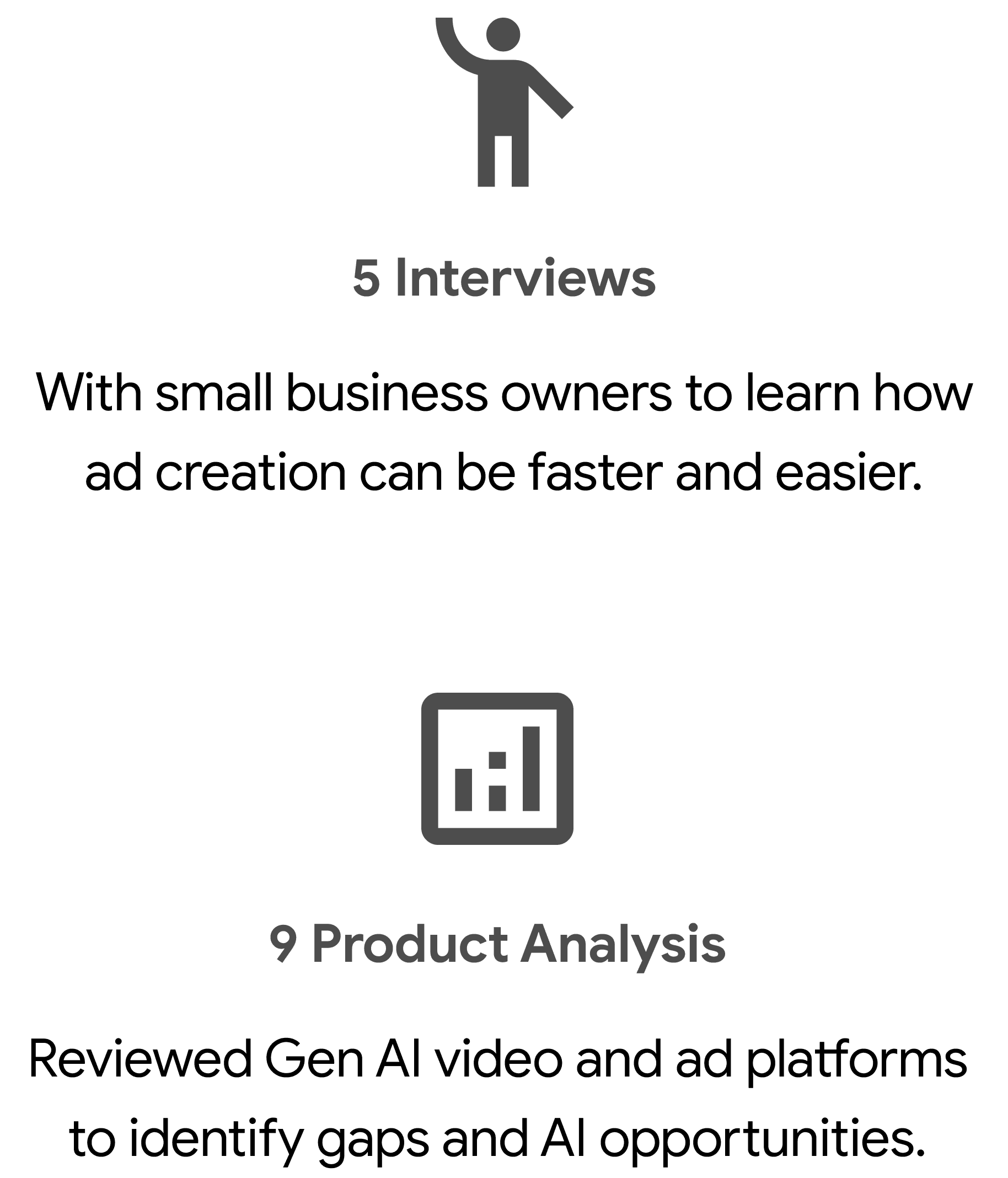

What I learned
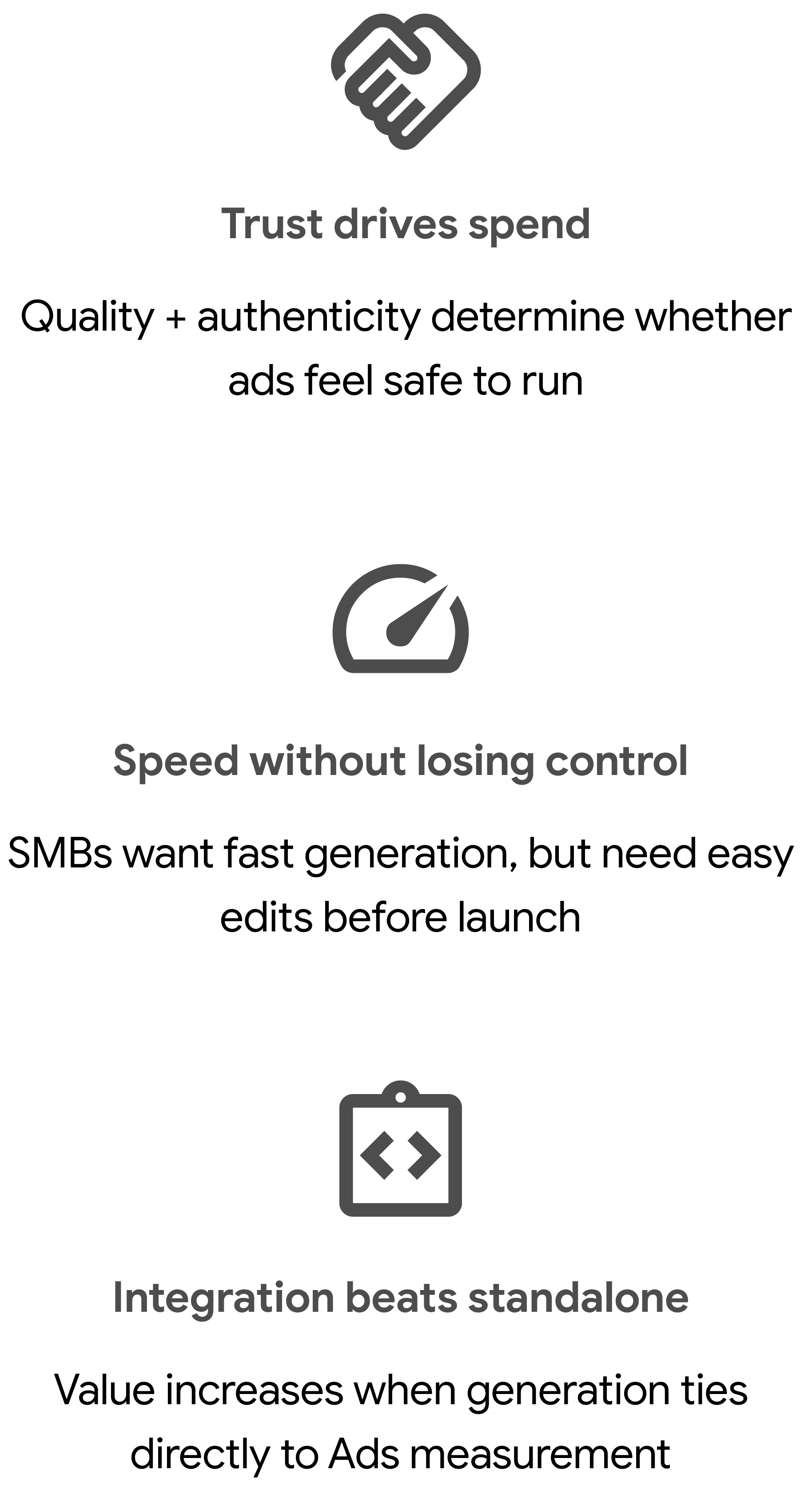


Emotioanls Trust / Authenticity

Emotioanls Trust / Authenticity

Creative Control

Creative Control

Time & Resource Saving

Time & Resource Saving

AI Skepticism

AI Skepticism

Visual Quality / Realism

Visual Quality / Realism

Platform Integration & Workflow

Platform Integration & Workflow
User Research Patters
I documented interviews, pulled quotes, and synthesized patterns.
Competitive Landscape
I then pressure-tested assumptions against real GenAI video tools.


Problem & Opportunity
Most productivity tools help people track work, but fail to support accountability with friends in a way people actually retun to.
Before
Video = Slow + External Tools
Missing
Trust + Control + Fast Learning
Opportunity
AI Video inside Google Ads
Target User
This is for SMBs running their own ads who need speed and results without an agency.
User Core Needs

Generate Fast

Generate Fast

Edit Control

Edit Control

CTR, CVR, CPA Clarity

CTR, CVR, CPA Clarity

Trust Cues

Trust Cues

A/B Variants

A/B Variants
Product Goals & Strategy
What “winning” meant for users and the business.

USER
Wants a faster video generation method
01
BUSINESS
Increase video adoption and faster ideation

USER
Wants a faster video generation method
01
BUSINESS
Increase video adoption and faster ideation

USER
Choose from multiple ads to see which is doing best
Improve efficiency via CTR | CVR | CPA decisions
02
BUSINESS

USER
Choose from multiple ads to see which is doing best
Improve efficiency via CTR | CVR | CPA decisions
02
BUSINESS
The tradeoff we optimised for:

Trade Off
Basic edits vs pro editor
Kept lightweight trimming + swaps; avoided timeline/VFX complexity.
“Edit required” task completion rate (can users make the needed change?).
Used structured levers (tone, pacing, scenes) instead of endless prompting.
Control satisfaction (1–5) + number of regeneration loops.
Designed for campaign context, export formats, and measurement from day one.
Drop-off points across the flow + time from draft → publish.
Guided controls vs full freedom
In-Ads flow vs standalone tool
Explanation
Test

Trade Off
Basic edits vs pro editor
Kept lightweight trimming + swaps; avoided timeline/VFX complexity.
“Edit required” task completion rate (can users make the needed change?).
Used structured levers (tone, pacing, scenes) instead of endless prompting.
Control satisfaction (1–5) + number of regeneration loops.
Designed for campaign context, export formats, and measurement from day one.
Drop-off points across the flow + time from draft → publish.
Guided controls vs full freedom
In-Ads flow vs standalone tool
Explanation
Test
Ideation
Directions Explored
DIRECTION 1

Generate video from campaign inputs
Value: Fast Start
Risk: Low trust if output feels like black box

Generate video from campaign inputs
Value: Fast Start
Risk: Low trust if output feels like black box
DIRECTION 2

Create variants for A/B testing
Value: Faster experimentation
Risk: Too many options without evaluation

Create variants for A/B testing
Value: Faster experimentation
Risk: Too many options without evaluation
DIRECTION 3

End-to-end flow:
generate → edit → variants → export
Value: Most compete + Ads Native
Risk: Could feel complex if not structured

End-to-end flow:
generate → edit → variants → export
Value: Most compete + Ads Native
Risk: Could feel complex if not structured
Convergence

Convergence Criteria
Trust/Quality
Speed to first draft
User Control
A/B Readiness
CTR | CVR | CPA Clarity
Ads workflow integration
DIRECTION 1
DIRECTION 2


















DIRECTION 3

Convergence Criteria
Trust/Quality
Speed to first draft
User Control
A/B Readiness
CTR | CVR | CPA Clarity
Ads workflow integration
DIRECTION 1
DIRECTION 2


















DIRECTION 3
Final Plan
The final plan is a structured 5-step Ads flow that gets to a usable video fast, supports edits, and makes testing measurable.
Upload Hub


Smart Scene Hub


Preview + AI Enabled Edit


A/B Variant Generator


Export & Integrate
Design System & Visual Language
I extended Google’s Material 3 system with a small set of AI-specific components so Veo video creation, editing, and variant testing feels native inside Google Ads, clear about what’s AI-generated vs user-controlled, and easy to learn.
Typography
Aa
Google Sans
Regular and Medium
Title Text
Title 01
Title 02
Profile
Tab Headings
Large Tabs
Large Text
GS - Medium
GS - Regular
GS - Medium
GS - Medium
GS - Medium
GS - Regular
22 pt
22 pt
12 pt
14 pt
16 pt
30 pt
Body Text
Main Body
Regular
Small
Forms
GS - Medium
GS - Regular
GS - Medium
GS - Regular
14 pt
12 pt
12 pt
16 pt
Buttons
Button 1
Button 2
Indicator
GS - Medium
GS - Regular
GS - Medium
14 pt
14 pt
8 pt
Color Palette
Brand Colors


Text Styles


Icons


Background


Addition to Design System

Campaign Cards
Final Generated Video Player
Progress Bar
AI Chatbox
Media Addition Icons and States
Icons Set and States
Social Media Icons
Generated Clips Player
Added Media
Status Cards

Campaign Cards
Final Generated Video Player
Progress Bar
AI Chatbox
Media Addition Icons and States
Icons Set and States
Social Media Icons
Generated Clips Player
Added Media
Status Cards
Key Screens
The final direction combined social presence, reflection, and ambient motivation into a repeatable, low-pressure loop.
AI-Video Generation Option


Campaign Dashboard

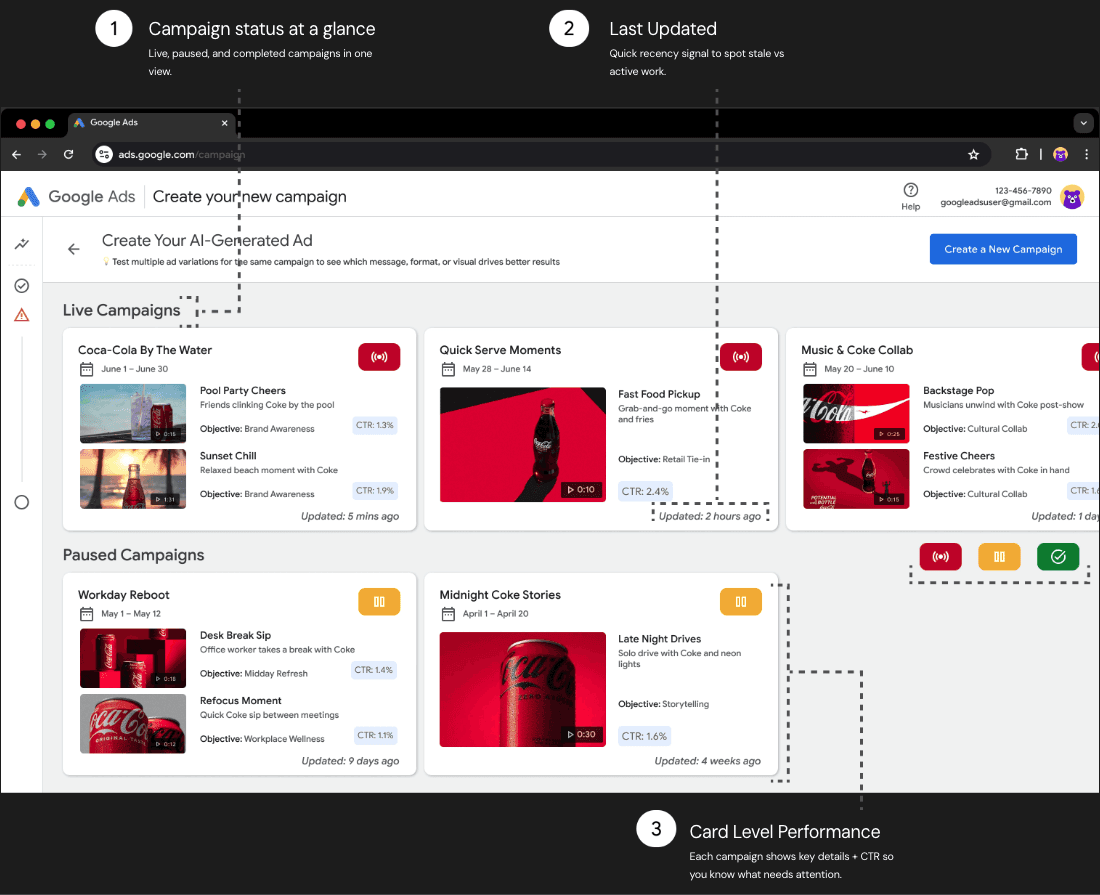


Multi-media Upload


Prompt-based Creation (Gemini)


Smart Clip Editing
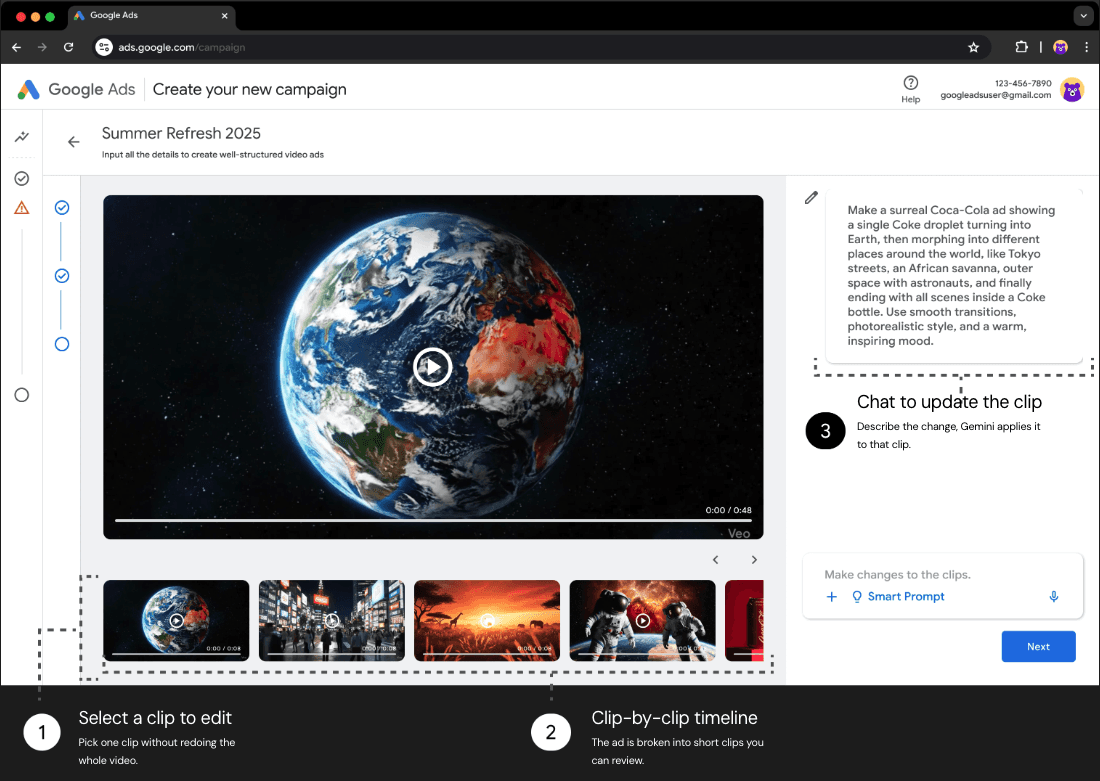

Built-in A/B Testing
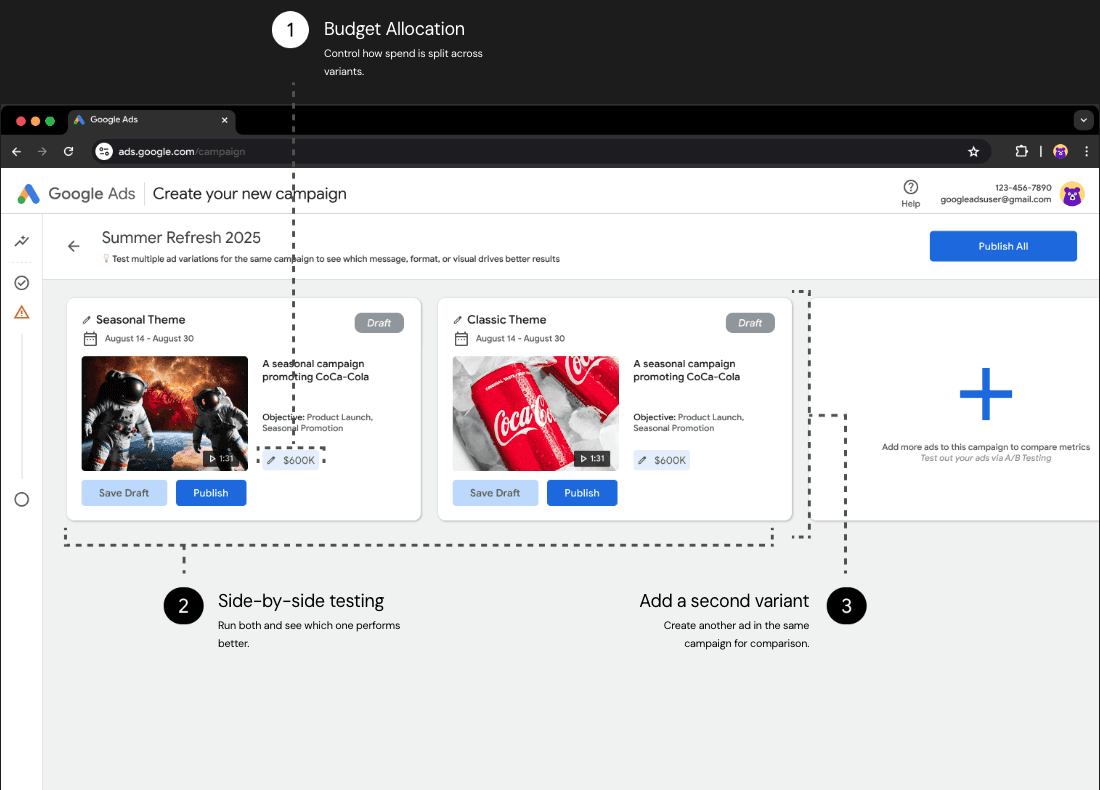

Performance Insights


Testing, Iteration, & Validation
To validate feasibility, I reached out to Google Ads engineers for technical input. Together, we evaluated each feature based on engineering effort, design fit, and business value.
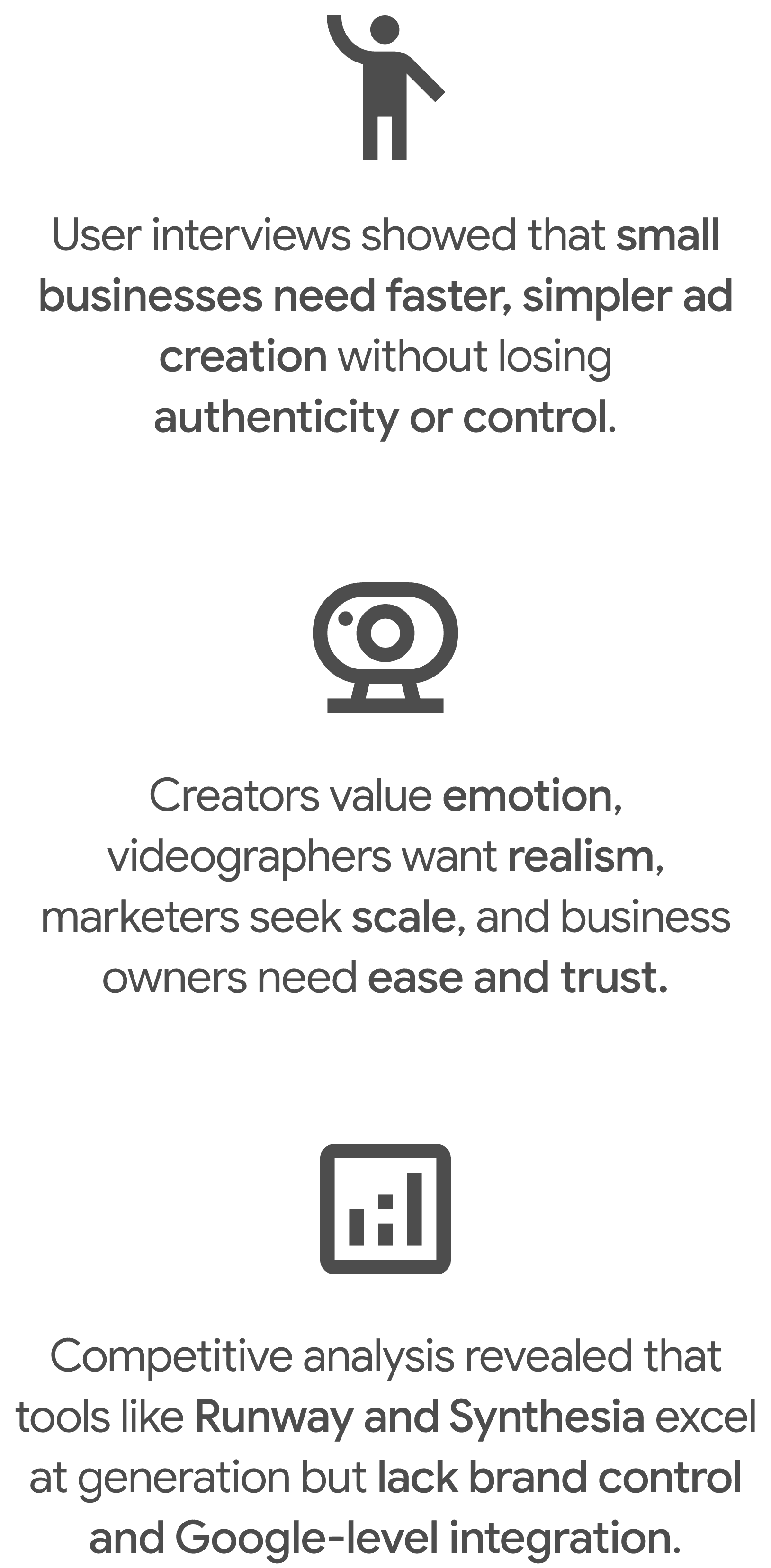

Outcome & Ownership
Impact (Estimate Only)
~ 90%
Faster time to first video ad
~ 2-3x
More video variants tested per campaign
~ 30-50%
Less effort to reach a decision
Ownership Flow
Research


Strategy


System Design


Execution


Validation




